Skilled Worker visa: early insights evaluation
Published 15 July 2022
Authors: IFF Research and Home Office Analysis and Insight
Any enquiries regarding this publication should be sent to [email protected].
Background
Since the UK’s departure from the European Union, and the end of the free movement accord, the Home Office introduced a new points-based system (PBS) as part of the new Future Borders and Immigration System (FBIS). There are different routes of access to the UK under the new FBIS, including the Skilled Worker visa. Those eligible to apply for a visa via the Skilled Worker route must have a job offer from a sponsor (UK employer) and meet both the English language and salary requirements of the route.
This research provides important early insights into the decision-making process for workers who have migrated using the route, and for employers to recruit skilled migrant workers through the new Skilled Worker migration route.
Methods
Home Office Analysis and Insight commissioned IFF Research to conduct 15-minute telephone interviews with 50 Skilled Worker visa holders and 50 licensed sponsors who had employed at least one employee via the Skilled Worker visa route. IFF Research surveyed the two groups separately and conducted fieldwork concurrently between 22 November 2021 and 17 December 2021. The team initially emailed respondents to invite them to opt-in to the research via an online booking portal through which they provided their contact details and could indicate their preferred time(s) to be called for an interview. Telephone contact details were not available for the worker sample but were available for employer sponsors.
For both strands, researchers drew the sample to meet quotas.
- They contacted and screened around 8,700 skilled workers to meet quotas based on nationality and occupation (based on 4-digit standard occupational classification codes). They drew the sample in three waves and sent a minimum of two reminders to encourage response.
- They contacted and screened around 3,850 sponsor employers to meet quotas based on whether they were a ‘new’ sponsor, their sector and company size. In the second half of the fieldwork, the team also telephoned employers and sent up to four email reminders to help boost the response for specific quotas.
IFF Research developed the questionnaires in partnership with the Home Office. They comprised a mix of pre-coded quantitative questions, with open-ended follow-ups after key questions. For open-ended questions, interviewers recorded verbatim responses and probed to obtain additional explanatory detail. The team tabulated the quantitative data for analysis and added open-ended responses to a qualitative analysis framework, which they analysed to draw out key themes and note illustrative quotes. Members of the IFF Data Services and Research team iteratively checked outputs for quality assurance.
Part 1: Research with Skilled Worker migrants
Executive summary
How do skilled workers decide to migrate to the UK?
- the main factors considered about working and living in the UK were not visa-related, but the English language, career progression and professional fit
- the Skilled Worker visa route influenced the decision to work in the UK for just over half (54%), mainly thanks to the ability to extend the visa and the ability to settle with dependents
- 10% of those surveyed were also considering applying for a different visa
What was the visa application process like for skilled workers?
- overall, there were high levels of satisfaction (92%) with the overall application process
- most of those surveyed agreed that the application process and guidance provided were good; however, there is room for improvement in the length of time required to submit and receive a decision
- around half are confident that they understand the criteria for awarding tradeable points, which influenced three out of ten to apply by them
How do skilled workers find working and living in the UK?
- nearly all the respondents felt their job suited their skills and expectations and the majority (76%) felt that their pay met or exceeded their expectations
- a third of the respondents reported no challenges in adjusting to life in the UK; for those who did, finding suitable accommodation was the most common challenge.
- the majority plan to extend their stay in the UK beyond the duration of their current visa
Demographics of skilled workers
Age
The average age of skilled workers interviewed is 34, similar to the average age of 32 in the total sample.
| Age group | Number of interviews |
|---|---|
| 18-24 | 3 |
| 25-29 | 16 |
| 30-34 | 9 |
| 35-39 | 12 |
| 40-44 | 3 |
| 45-49 | 4 |
| 50-54 | 1 |
| 55-59 | 2 |
| Total | 50 |
Gender
The profile of visa holders interviewed leaned slightly toward the male side (58%). A slightly higher proportion of men were surveyed in the research than the total proportion of men in all Skilled Worker migrants.
| Gender | Percentage of visa holders interviewed |
|---|---|
| Female | 42% |
| Male | 58% |
Nationality
IFF Research interviewed Skilled Worker migrants from 13 nationalities to capture a wide range of perspectives. This was not representative of the nationality of all Skilled Worker migrants.
| Nationality | Number of interviews |
|---|---|
| Brazil | 7 |
| India | 6 |
| Nigeria | 6 |
| USA | 5 |
| Pakistan | 5 |
| South Africa | 4 |
| Canada | 3 |
| Australia | 3 |
| Ukraine | 3 |
| China | 2 |
| Russian Federation | 2 |
| Turkey | 2 |
| Romania | 2 |
| Total | 50 |
Occupation
The research was aiming for a diverse selection of occupations, not a representative one, to capture as many perspectives as possible.
| Occupations | Number of interviews |
|---|---|
| 2136 - Programmers and software development professionals | 6 |
| 2126 - Design and development engineers | 3 |
| 2231 - Nurses | 3 |
| 2311 - Higher education teaching professionals | 3 |
| 2423 - Management consultants and business analysts | 3 |
| 2425 - Actuaries, economists and statisticians | 3 |
| 1115 - Chief executives and senior officials | 2 |
| 2119 - Natural and social science professionals n.e.c. | 2 |
| 2122 - Mechanical engineers | 2 |
| 2424 - Business and financial project management professionals | 2 |
| 3538 - Financial accounts managers | 2 |
| 1132 - Marketing and sales directors | 1 |
| 1136 - Information technology and telecommunications directors | 1 |
| 1259 - Managers and proprietors in other services n.e.c. | 1 |
| 2129 - Engineering professionals n.e.c. | 1 |
| 2211 - Medical practitioners | 1 |
| 2221 - Physiotherapists | 1 |
| 2317 - Senior professionals of educational establishments | 1 |
| 2421 - Chartered and certified accountants | 1 |
| 2426 - Business and related research professionals | 1 |
| 2433 - Quantity surveyors | 1 |
| 3534 - Finance and investment analysts and advisers | 1 |
| 3535 - Taxation experts | 1 |
| 3543 - Marketing associate professionals | 1 |
| 3545 - Sales accounts and business development managers | 1 |
| 3562 - Human resources and industrial relations officers | 1 |
| 3565 - Inspectors of standards and regulations | 1 |
| 4122 - Bookkeepers, payroll managers and wages clerks | 1 |
| 6141 - Nursing auxiliaries and assistants | 1 |
| 6146 - Senior care workers | 1 |
| Total | 50 |
Choosing to work in the UK
The most important factors for skilled workers when considering working and living in the UK were not visa-related; most in our sample cited familiarity with the English language (92%), opportunities for career progression (92%) and a professional fit to job roles (88%).
Figure 1.1: Important factors when considering coming to or remaining in the UK
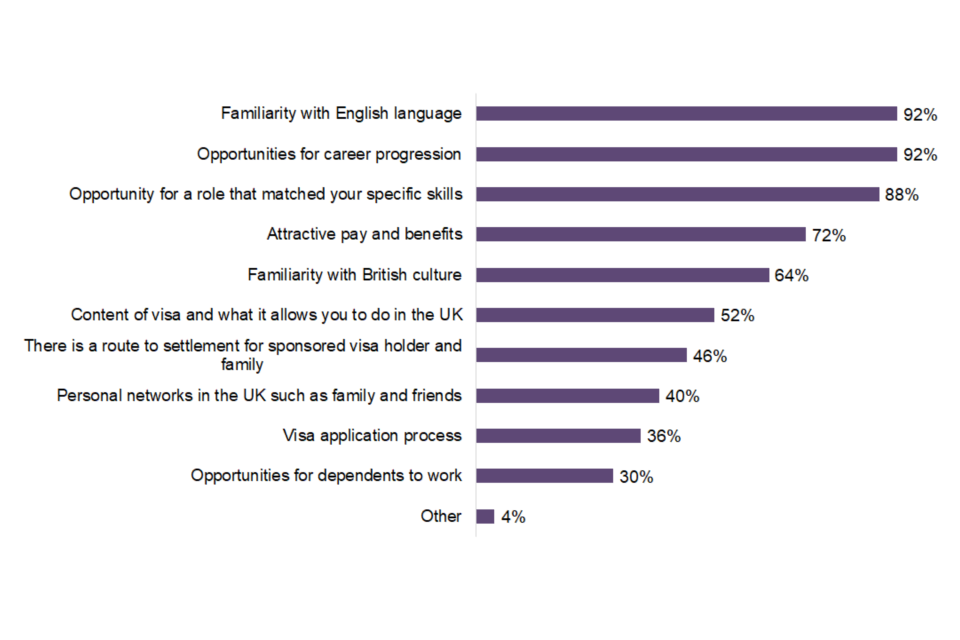
Notes:
- Which, if any, of the following factors were important to you when considering coming to, or remaining in the UK to work and live? (base=50)
Most skilled workers surveyed had applied for the job themselves (78%). Around 1 in 5 (18%) were approached by their employer. The most cited reason for choosing the job was that it was a good fit for their skills, qualifications and experience (68%).
Figure 1.2: Main reasons for choosing their job
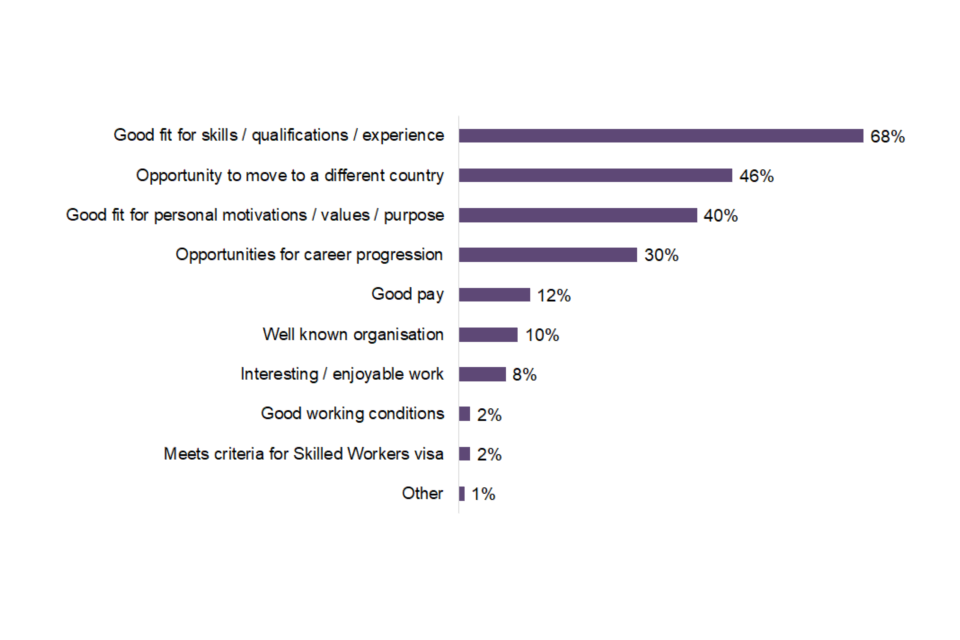
Notes:
- What were your main reasons for choosing this job? (base=50)
When thinking about the Skilled Worker visa, just over half (54%) of those surveyed said the visa itself had influenced their decision to work in the UK.
Figure 1.3: Extent to which the Skilled Worker visa influenced application decisions
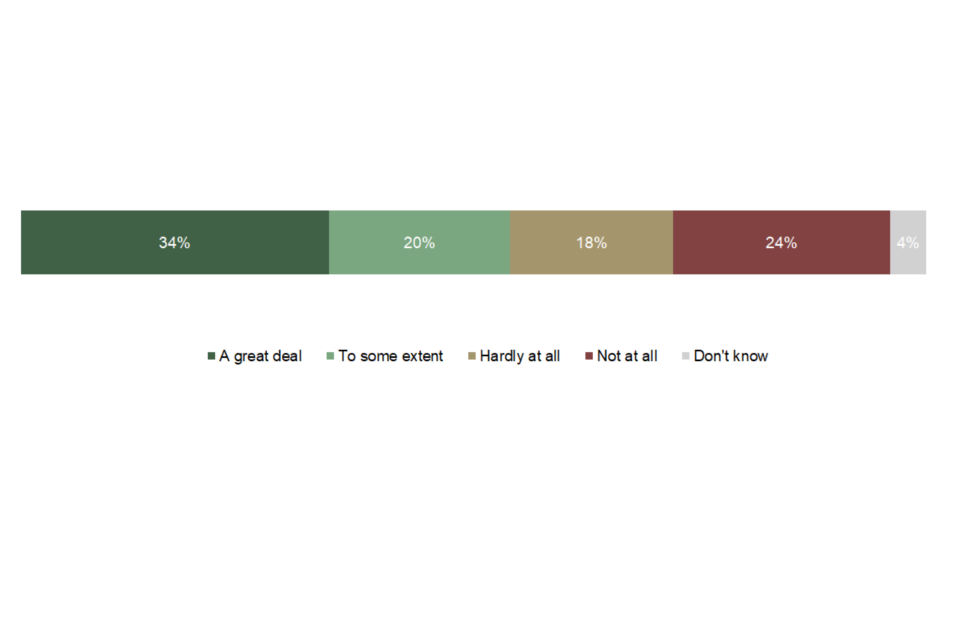
Notes:
- To what extent, if at all, did the Skilled Worker visa influence your decision to apply to work in the UK? (base=50)
When asked to expand on their response, visa holders gave the following explanations for how the Skilled Worker visa impacted their decision to work in the UK.
“I liked the opportunity and the experience I would get here. Also, I could stay longer term on the Skilled Worker visa. It helped me decide to move here.” (Skilled Worker visa holder from Pakistan, 2425 – Actuary, economist or statistician)
“It made me more picky and particular about my job because the Skilled Worker visa does not allow me to change jobs; I had to make sure the job worked out for me.” (Skilled Worker visa holder from India, 2136 – Programmer or software development professional)
Notes:
- How did the Skilled Worker visa have an impact upon your decision to apply to work in the UK? Those for whom the SW visa had an impact upon their decision. (base=27)
When prompted to think about which feature of the Skilled Worker visa had the biggest impact on their decision to work in the UK, the ability to extend was most stated as having an impact, whereas the ability to settle with dependents was most important overall.
Figure 1.4: Features with the biggest impact
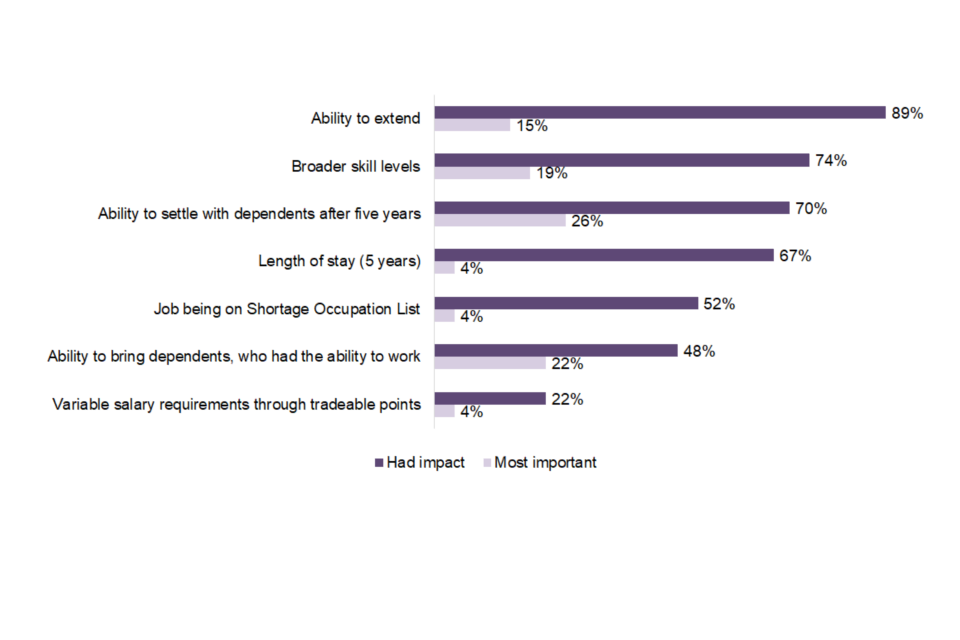
Notes:
- Which of the following features had an impact upon your decision to work in the UK? And which of those features had the biggest impact? (base=27)
Before applying for the Skilled Worker visa, 76% of those surveyed had considered other options. Just over half (56%) considered remaining in their home country, while 10% said they considered applying for a different visa.
Figure 1.5: Alternative options
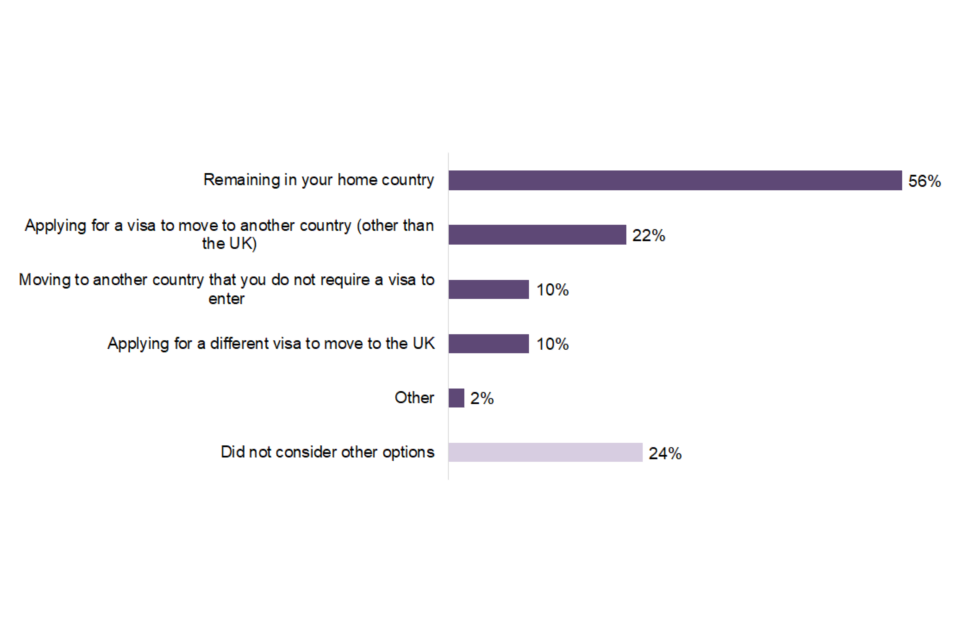
Notes:
- Before you applied for the Skilled Worker visa, which of the other following options were you also considering? (base=50)
For those who considered other UK visas, they gave the following illustrative reasons for why they ultimately chose the Skilled Worker visa.
“It’s more permanent [than other visas] and I got 3 years stay on the visa. It seemed like a better choice.” (Skilled Worker visa holder from Russia, 2423 – Management consultant or business analyst)
“I realised that my company could assist me in getting a Skilled Worker visa and applying for a Tier 1 visa seemed more complicated.” (Skilled Worker visa holder from Ukraine, 2136 – Programmer or software development professional)
Notes:
- And why did you choose the Skilled Worker visa route? Those who had previously considered other UK visas. (base=5)
Experience of visa application process
The most common way that skilled workers in our sample found out about the route was through their employer – about half found out this way (54%). About one in four had also heard about the Skilled Worker visa via the UK government website (38%).
Figure 1.6: Finding out about the visa
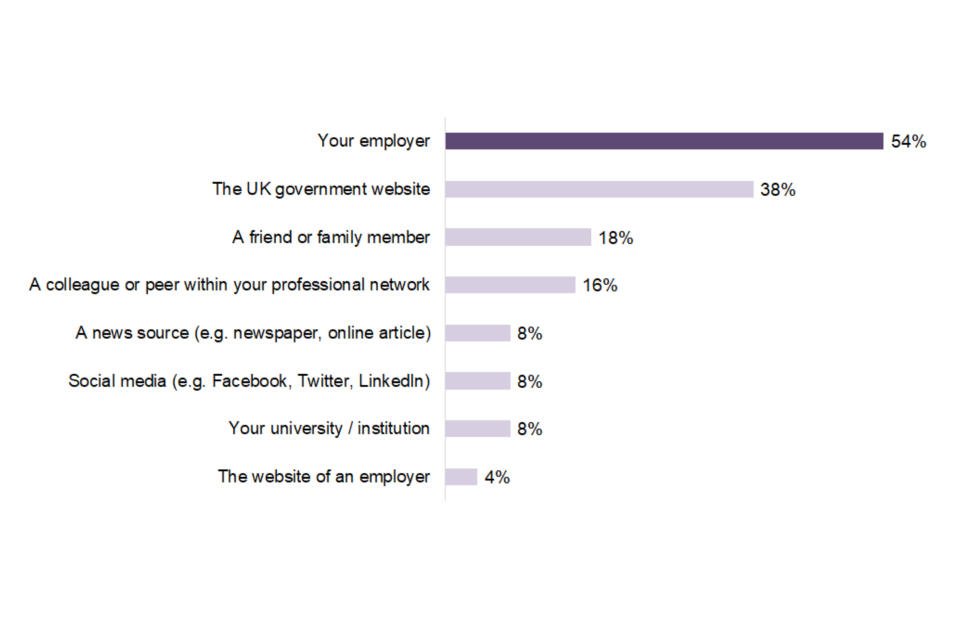
Notes:
- How did you hear about the Skilled Worker visa? (base=50)
Two-thirds of respondents (66%) received help to complete the visa application form. They mostly received help from sponsors to complete the application.
Figure 1.7: Help with the application form
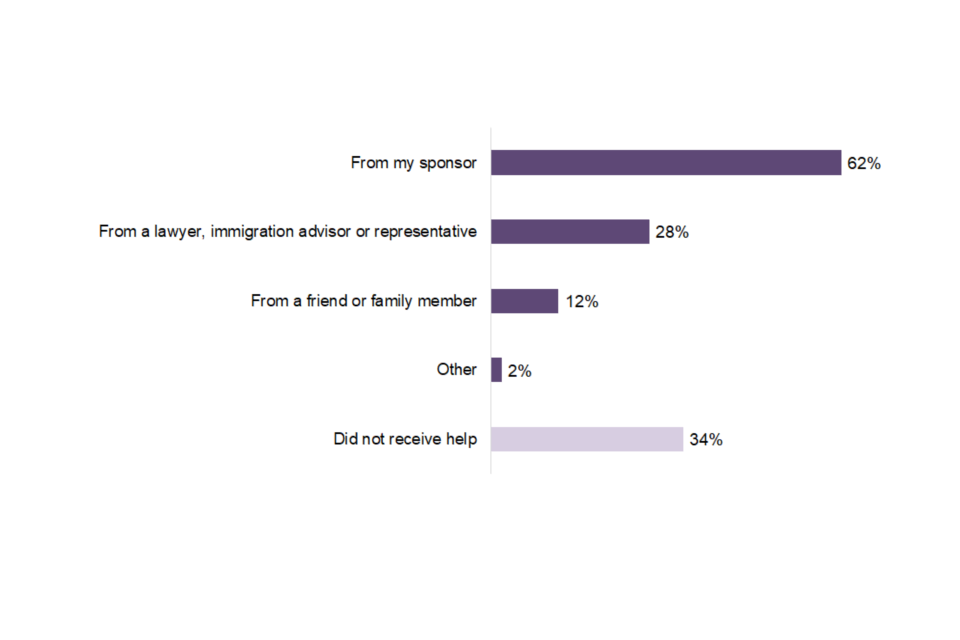
Notes:
- Thinking about the application process, did you get help from anyone when completing your visa application form? (base=50)
“The university sent some information about how I should complete the application form. For example, I was told that even if I have a PhD, I was instructed to select the no option because that didn’t count towards the total points needed to be eligible, for this particular application.” (Skilled Worker visa holder from Romania, 2311 – Higher educational teaching professional)
“My sponsor arranged a lawyer who helped with all of the paperwork and the payments. He was writing emails to me and I was complying with all of the requirements.” (Skilled Worker visa holder from the United States, 6146 – Senior care worker)
Notes:
- In what way did they help you? (base=33)
Skilled workers in our sample reported high levels of satisfaction with the overall visa application process, with 92% responding “very satisfied” or “fairly satisfied”.
Figure 1.8: Satisfaction with the visa application process
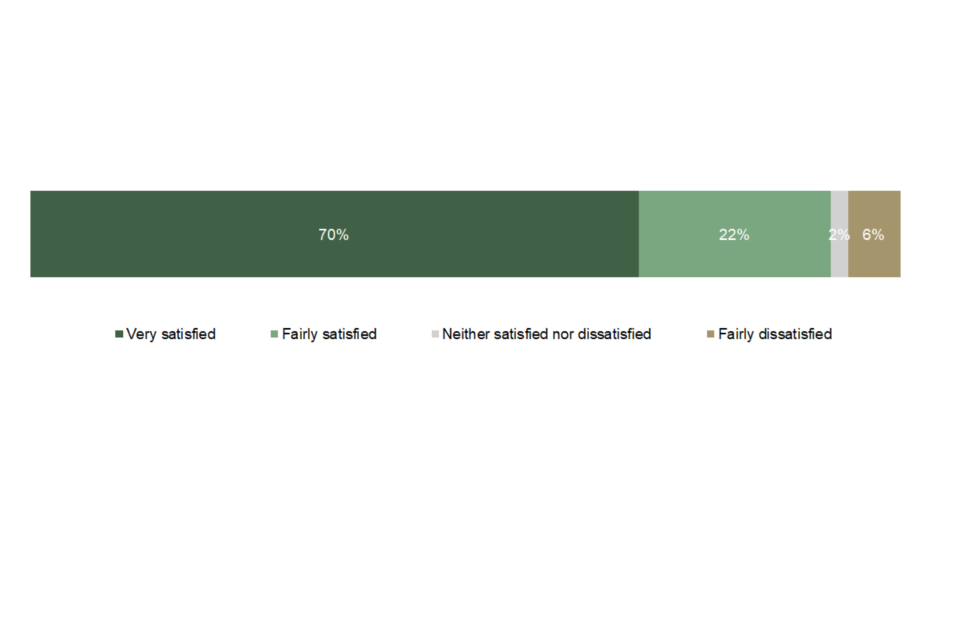
Notes:
- Overall, how satisfied or dissatisfied were you with the Skilled Worker visa application process as a whole? (base=50)
Most respondents also agreed that the visa application process was open and transparent (90%), and that the quality of written guidance was good (94%). Respondents noted there is some room for improvement in the length of time required to submit and receive a decision.
Figure 1.9: Views on the visa application[footnote 1]
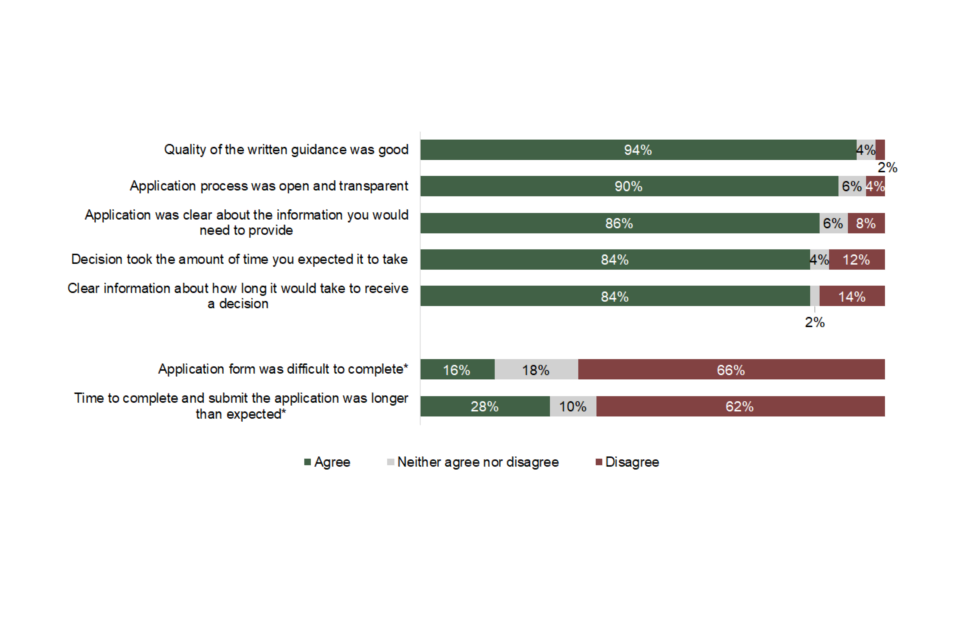
Notes:
- To what extent do you agree or disagree with the following statements relating to your Skilled Worker visa application? (base=50)
The following illustrative quotes demonstrate elements of the visa application process which respondents felt require improvement.
Greater transparency and tracking
“You have to wait for the consulate to let you know when it’s completed [application]. There is no helpline to track the process. It could be a bit more transparent. A helpline or at least an email would be beneficial.” (Skilled Worker visa holder from the United States, 2421 – Chartered or certified accountant)
Travel history check is overly stringent
“There was a long list of travel dates and details of countries I had visited that I had to provide for the last ten years. A smaller year span would make it an easier process.” (Skilled Worker visa holder from Pakistan, 2423 – Management consultant or business analyst)
Proof of English language
“The language requirement was the most unclear aspect of the application process, so if that could be clarified it would help because I ended up taking an English-language test that I subsequently found out I didn’t need to take and I was unable to get hold of someone to clarify the question.” (Skilled Worker visa holder from Brazil, 2119 – Natural and social science professional n.e.c.)
Notes:
- What, if anything, do you think could be done to improve the application process? (base=50)
Other possible improvements mentioned (grouped into broad themes) were:
- shortening the length of the visa application form
- clearer wording in questions about travel history and dependent applications
- greater clarity on the points-based system
- a telephone helpline in case of emergencies (such as loss of passport)
- better access to biometric centres
- clarification at the start of the process on associated costs and parties responsible
When asked to reflect on their understanding of eligibility criteria for the Skilled Worker visa, 98% of our sample were either “completely confident” or “fairly confident” in their understanding.
Figure 1.10: Understanding of eligibility criteria
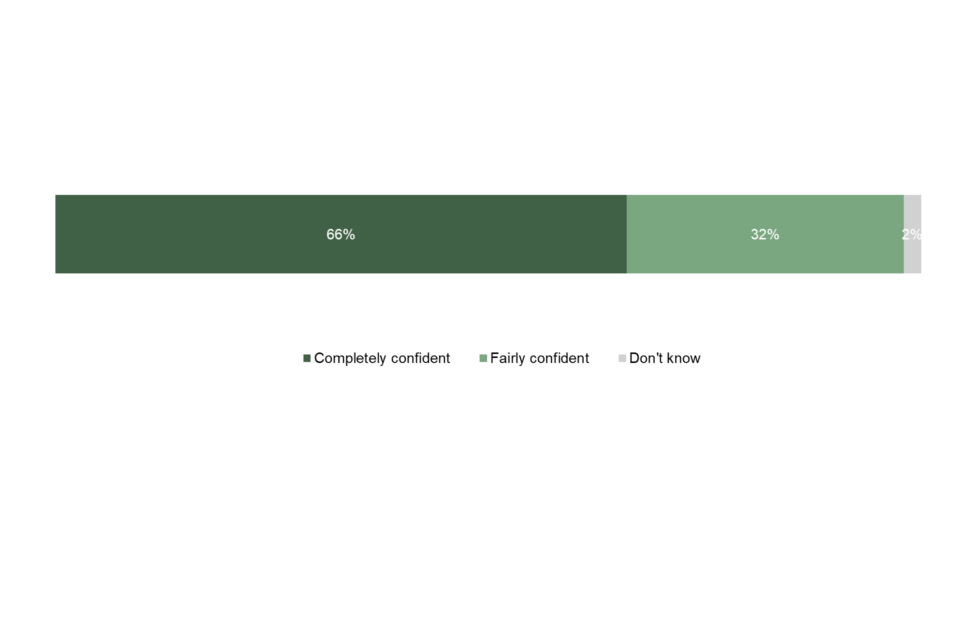
Notes:
- Whilst you were applying for the Skilled Worker visa, how confident were you that you understood the eligibility criteria? (base=50)
Confidence in understanding of tradeable points was slightly lower in our sample. Around half (54%) were confident they understood the criteria for awarding tradeable points, while three in ten reported that the availability of tradeable points had influenced their decision to apply for the Skilled Worker visa.
Figure 1.11: Understanding of criteria for tradeable points
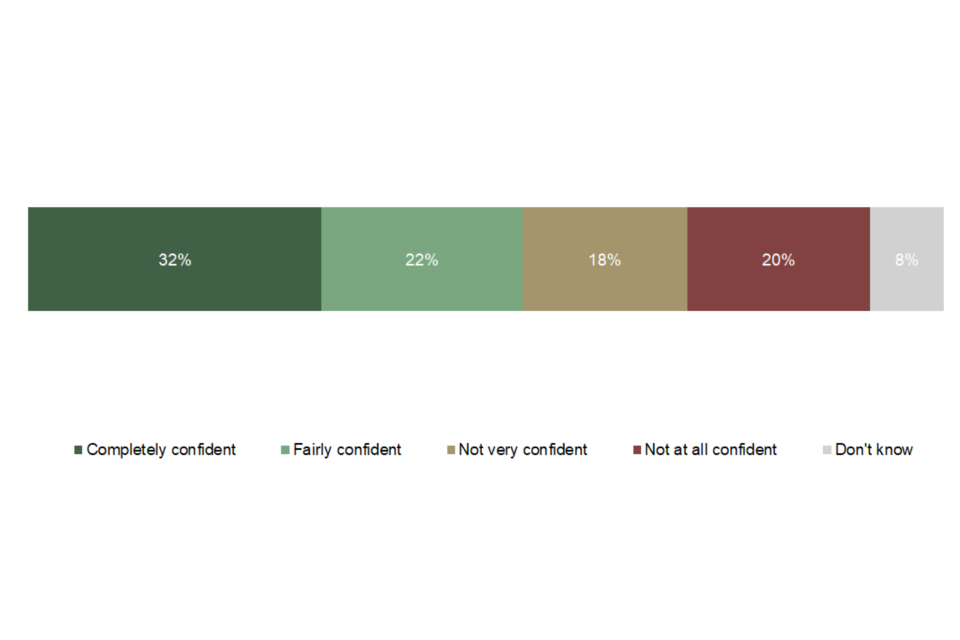
Notes:
- How confident would you say you were in your understanding of the criteria for awarding tradeable points? (base=50)
Figure 1.12: Impact of the availability of tradeable points on decisions to apply
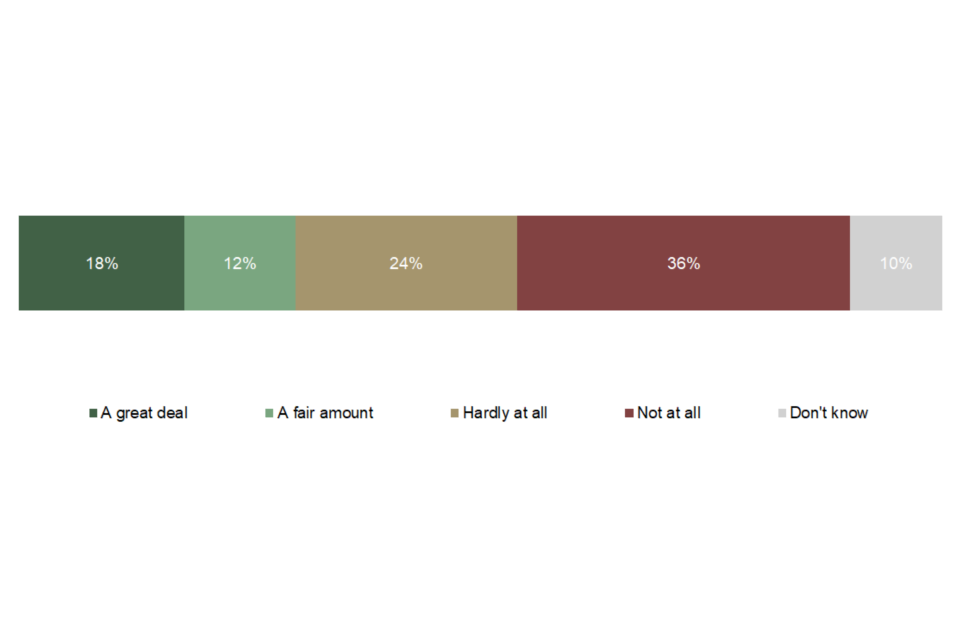
Notes:
- To what extent did the availability of tradeable points influence your decision to apply? (base=50)
When asked about how they used tradeable points, nearly all respondents in our sample of skilled workers who were applying to work in a shortage occupation had used this in their application.
Figure 1.13: Criteria which applied to applicants, and criteria used in applications[footnote 2]
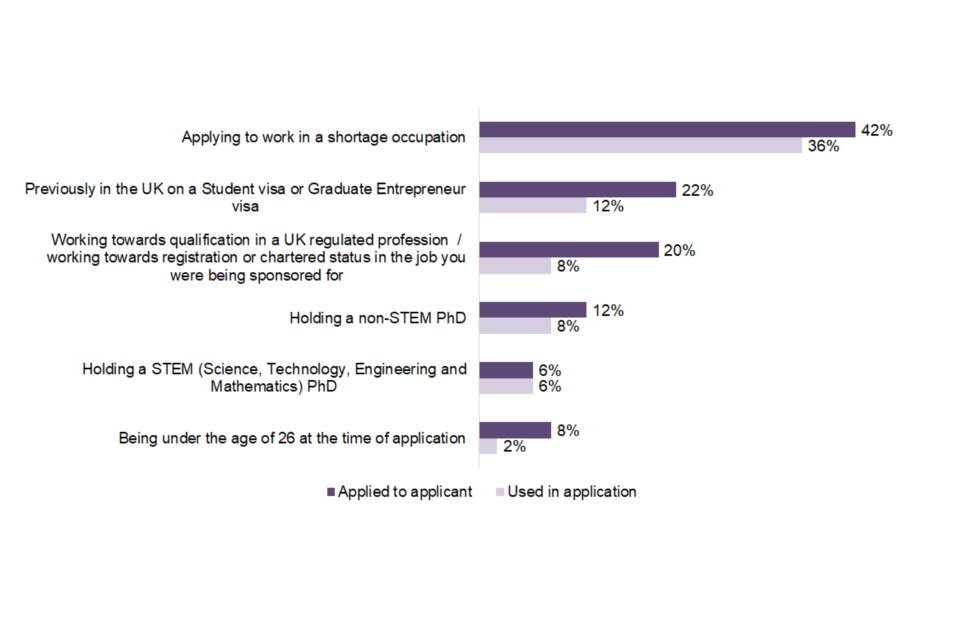
Notes:
- At the time of your application, which, if any, of the following applied to you? (base=50) And which, if any, of those criteria did you use as part of your application for the Skilled Worker visa? (base=35)
Reflecting on the costs associated with the Skilled Worker visa, about a third of those surveyed felt the application fee was unfair (38%), and close to half felt the cost of the immigration health surcharge was unfair (46%). It is notable from verbatim responses that comparative experience of healthcare systems in other countries could influence perceptions of the cost of the immigration health surcharge.
Figure 1.14: Fairness of fees
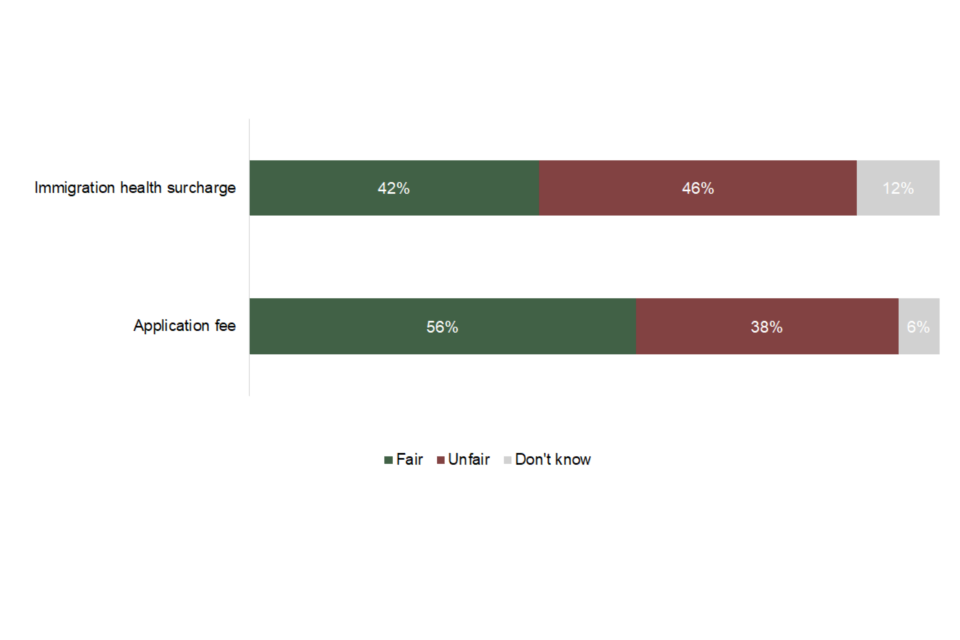
Notes:
- Thinking about the costs involved in the application process and the benefits attached to a Skilled Worker visa, to what extent do you think the fee for each of the following was fair or unfair? (base=50)
Immigration health surcharge is fair
“Coming from the US where you get bankrupted for breaking your arm. The cost I paid for 3 years surcharge is about the same as one year’s health insurance in the US.” (Skilled Worker visa holder from the United States, 2136 – Programme or software development professional)
Immigration health surcharge is unfair
“I need to pay the total surcharge for 5 years in one go, which is also unfair, rather than spreading it out.” (Skilled Worker visa holder from Australia, 1132 – Marketing and sales director)
Notes:
- Why do you think that the annual immigration health surcharge is fair/unfair? (base=50)
Being in the UK and future intentions
All Skilled Worker respondents felt that their current job suited their skills and expectations to at least some extent. A majority (76%) felt that their salary met or exceeded their expectations.
Figure 1.15: The extent permission holders felt that their current job suited their skills and experience
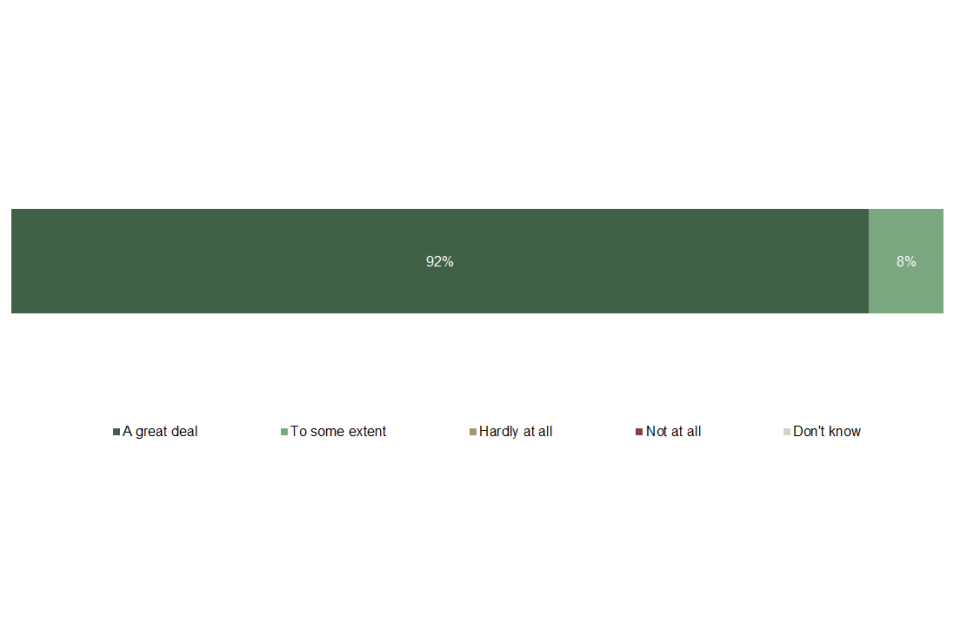
Notes:
- To what extent do you feel that your current job suits your skills and experience? (base=50)
Figure 1.16: The extent permission holders felt that their current job meets their pay expectations
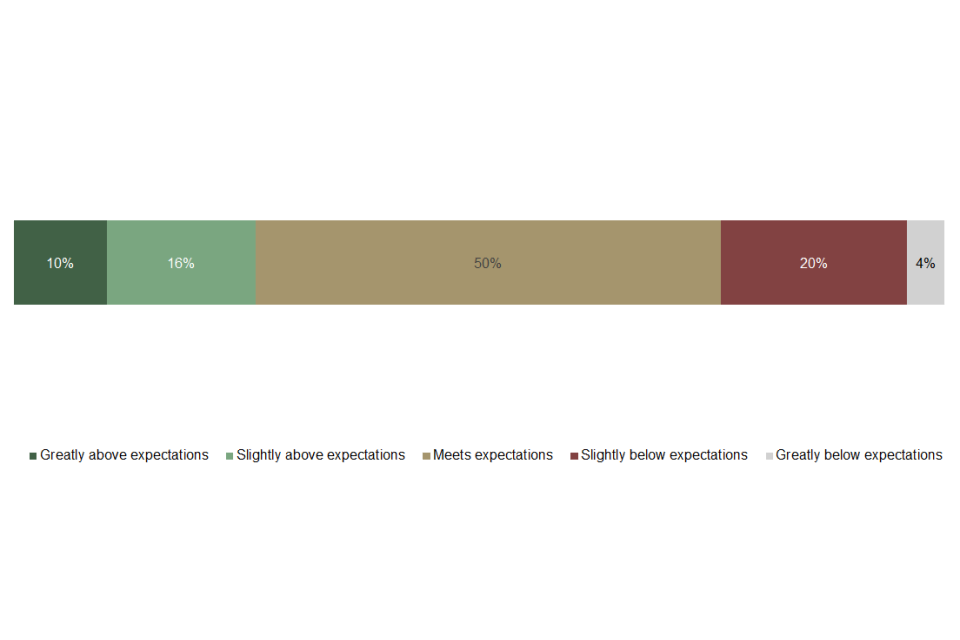
Notes:
- Based on your skills and experience, to what extent do you feel that your current job meets your pay expectations? (base=50)
About a third of respondents (35%) reported no challenges to adjusting to life in the UK. For those who did report experiencing challenges, finding suitable accommodation was most reported (20%).
Figure 1.17: Challenges permission holders have experienced while adjusting to life in the UK
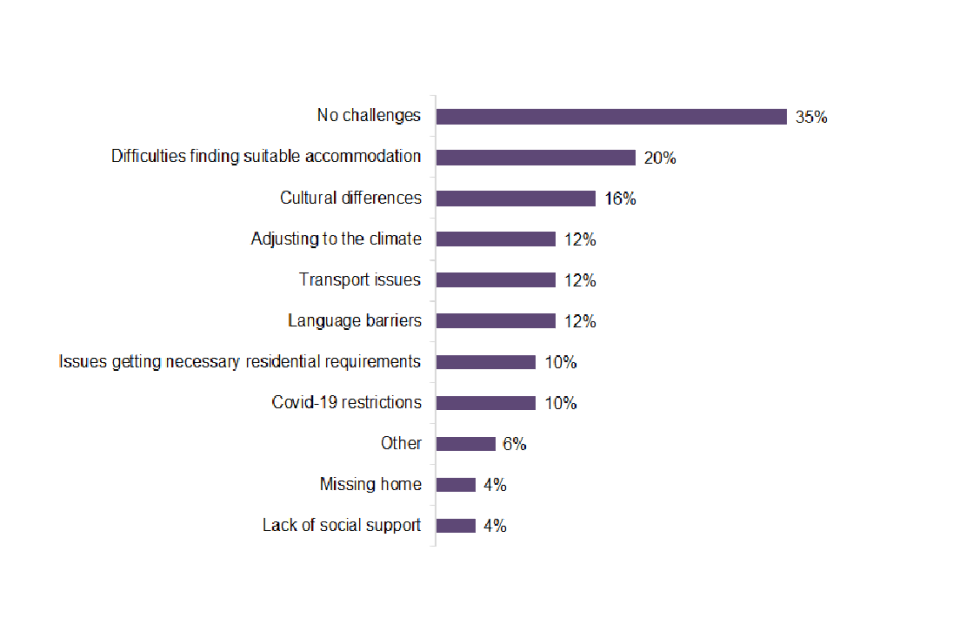
Notes:
- What, if any, challenges have you experienced in adjusting to life in the UK? (base=50)
When asked about future intentions, most (70%) skilled workers surveyed planned to extend their stay in the UK beyond the duration of their current visa.
Figure 1.18: Length of time permission holders intend to stay in the UK
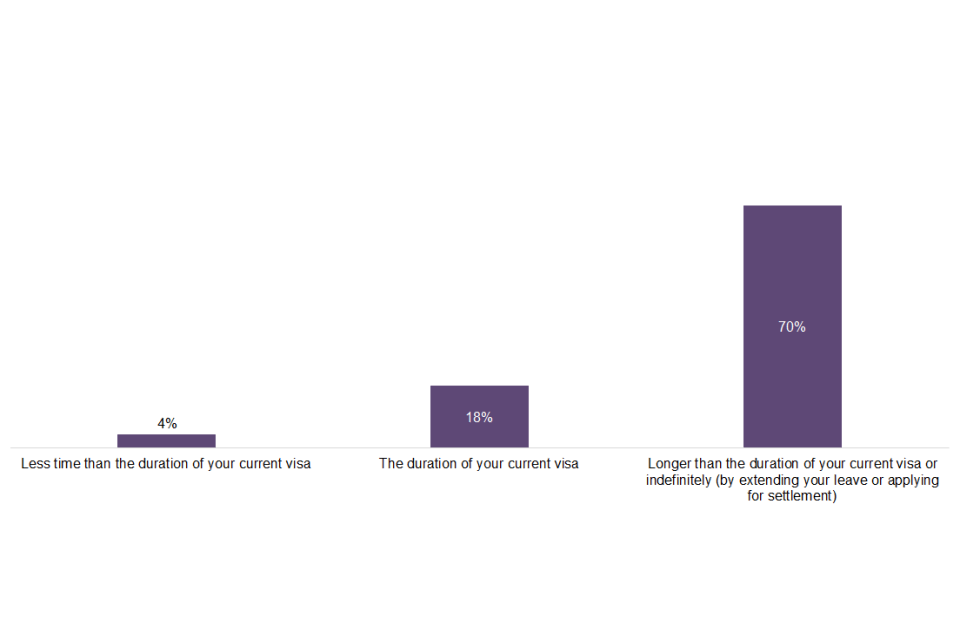
Notes:
- How long do you intend to stay in the UK? (base=50)
When asked to give final reflections on the Skilled Worker visa, most respondents felt that overall, it had been a good experience but also gave recommendations for improvement.
“I am very happy to be here, and it was a good decision.” (Skilled Worker visa holder from the United States, 2136 – Programme or software development professional)
“I think everything is good with the visa process, but I think everyone who enters the UK should receive a welcome pack, for example how to get accommodation or set up a bank account.” (Skilled Worker visa holder from Canada, 2424 – Business and financial project management professional)
Notes:
- Having answered these questions about the visa application process and your experience of living in/moving to the UK, do you have any further reflections that you would like to share? (base=50)
Part 2: Research with employer sponsors
Executive summary
How do employers decide to sponsor skilled workers?
-
there were a wide range of methods used to find these employees and half used multiple channels; the most common strategies used were targeted advertising on social media (including LinkedIn), advertising on UK jobsite(s) and advertising on own website
-
by far the most common alternative approach to using the Skilled Worker route was for sponsors to recruit from the domestic labour market
-
the need for specialist skills and a shortage of UK-based workers with the relevant skills or experience needed were the main reasons for recruiting via the Skilled Worker route; these were mentioned together in most cases
-
the removal of the resident labour market test had the biggest influence upon the decision to sponsor
-
half of sponsors had paid the full application fee and helped to gather evidence for applicants
What are employers’ future intentions for vacancies and sponsorship?
-
all sponsors surveyed expect to hire new employees in the next 3 to 6 months; of those, most will be eligible for an employee on a Skilled Worker visa
-
the most likely method sponsors will use to fill these future vacancies is to hire a UK worker, followed by sponsoring an applicant for the Skilled Worker visa route
-
the reasons sponsors gave for hiring a UK worker relate to speed, administration and cultural fit; for sponsoring skilled workers, the reasons relate to skills and a lack of UK applicants
Firmographics of employer sponsors
Share of new and established sponsors
Survey targets focused on achieving a split of 60% new and 40% established sponsors in interviews, compared to the 55/45 split found in the sample population.
Organisation size
| Size | Number of interviews |
|---|---|
| Micro (0-9 employees) | 8 |
| Small (10-49 employees) | 21 |
| Medium (50-249 employees) | 11 |
| Large (250-999 employees) | 3 |
| Very large (over 1,000 employees) | 7 |
| Total | 50 |
Region
There were no targets for interviewing set by geographic location, and the region could fall out naturally.
| Region | Number of interviews |
|---|---|
| London & South East | 24 |
| Wales & South West | 3 |
| Midlands & East of England | 9 |
| North East, Yorkshire & the Humber | 2 |
| North West | 3 |
| Scotland & Northern Ireland | 2 |
| Postcode not provided or not recognised | 7 |
| Total | 50 |
Industry sector
| Sector | Number of interviews |
|---|---|
| Other service activities | 8 |
| Accommodation and food service | 7 |
| Human health and social work | 6 |
| Information and communications | 6 |
| Manufacturing | 6 |
| Professional, scientific and technical | 6 |
| Construction | 4 |
| Wholesale and retail trade | 3 |
| Financial and insurance activities | 2 |
| Total | 50 |
Choosing to sponsor skilled workers
The employers interviewed had deployed a range of strategies to find the employees they had sponsored via the Skilled Worker route. Half of employers surveyed used more than one strategy to find these employees. The most common strategies used in tandem were targeted advertising on social media (e.g. LinkedIn), advertising on own website and advertising on UK jobsite(s).
Figure 2.1: Ways in which employers found employees recruited using the Skilled Worker route
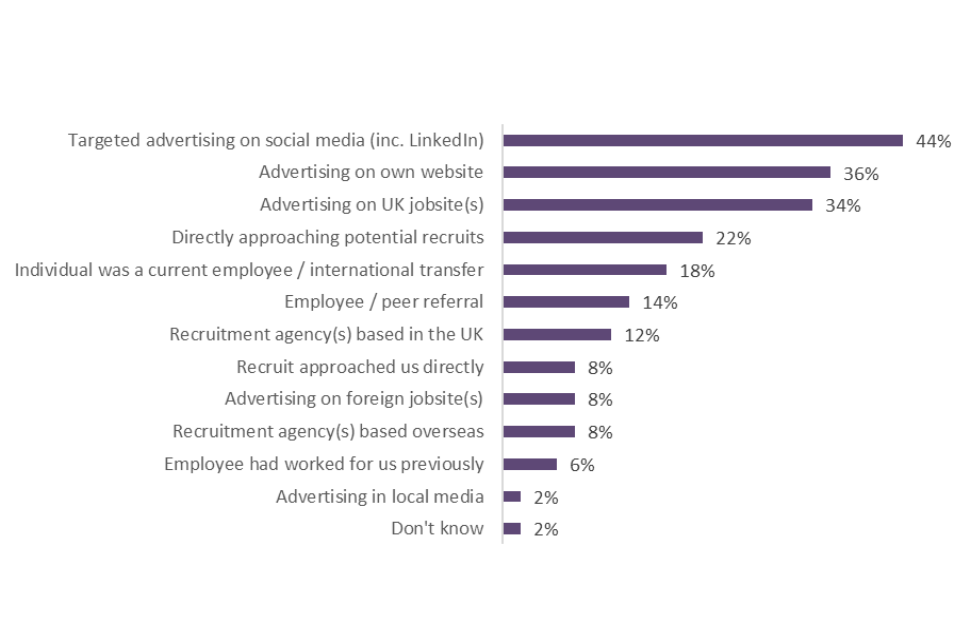
Notes:
- Thinking about the most recent vacancies that were filled via the Skilled Worker route, how did you find these employees? (base=50)
When prompted to consider alternative approaches to filling vacancies, by far the most common alternative to using the Skilled Worker route for the surveyed group of employers was to recruit from the domestic labour market (82%). A follow-up question asked if any employers had previously sought to engage government support to help with training or recruiting talent and about a third (34%) had used this option.
Figure 2.2: Approaches considered by employers for fulfilling roles and function, other than the Skilled Worker route
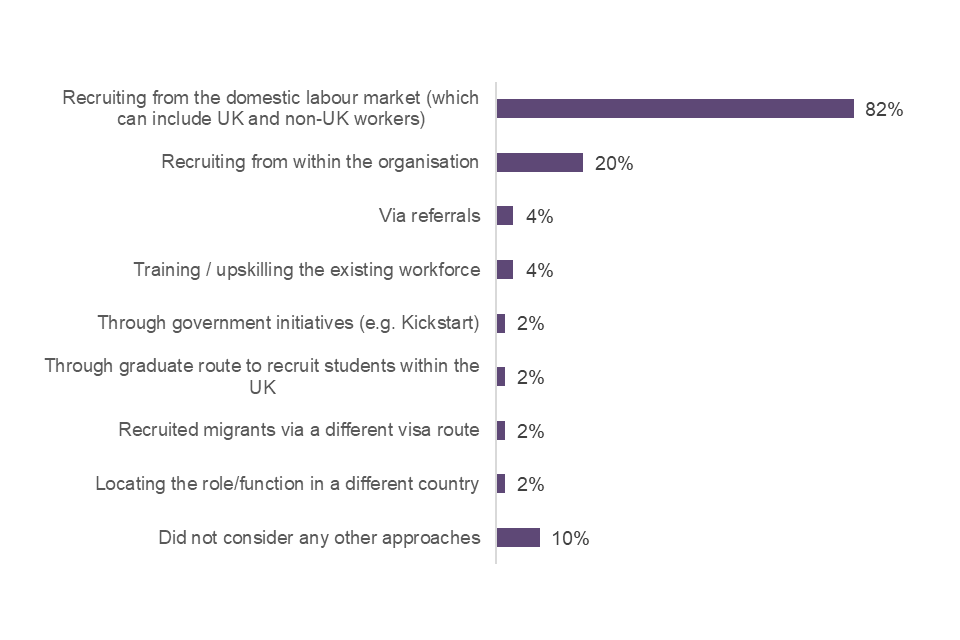
Notes:
- Thinking about the vacancies for which you employed workers via the Skilled Worker route, did you consider any other approaches to fulfilling the role(s) or function(s)? (base=50)
From our survey, the main reasons why employers recruited skilled workers were the need for specialist skills (76%) and a shortage of UK-based workers with the relevant skills or experience needed (64%). These two reasons were mentioned together in most cases.
Figure 2.3: Factors leading employers to recruit migrant workers on the Skilled Worker visa
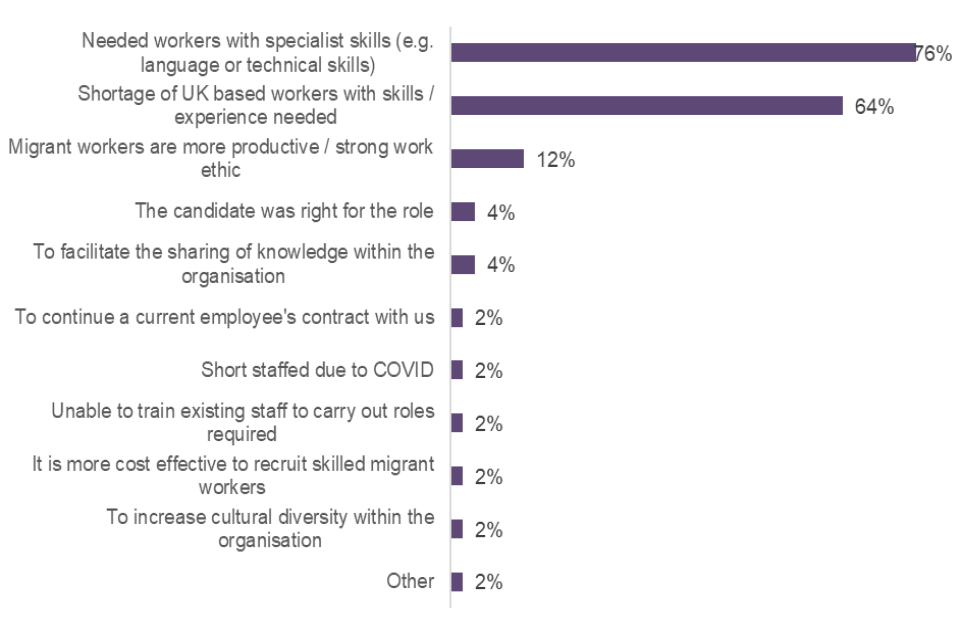
Notes:
- What factors led you to recruit migrant worker(s) on the Skilled Worker visa? (base=50)
Around four in ten employers surveyed felt that changes in sponsorship policy have made it easier to recruit skilled migrant workers. This increases to roughly six in ten for employers who already held a sponsorship licence before December 2020.
Figure 2.4: Impact of sponsorship policy on ease/difficulty of recruiting skilled migrant workers
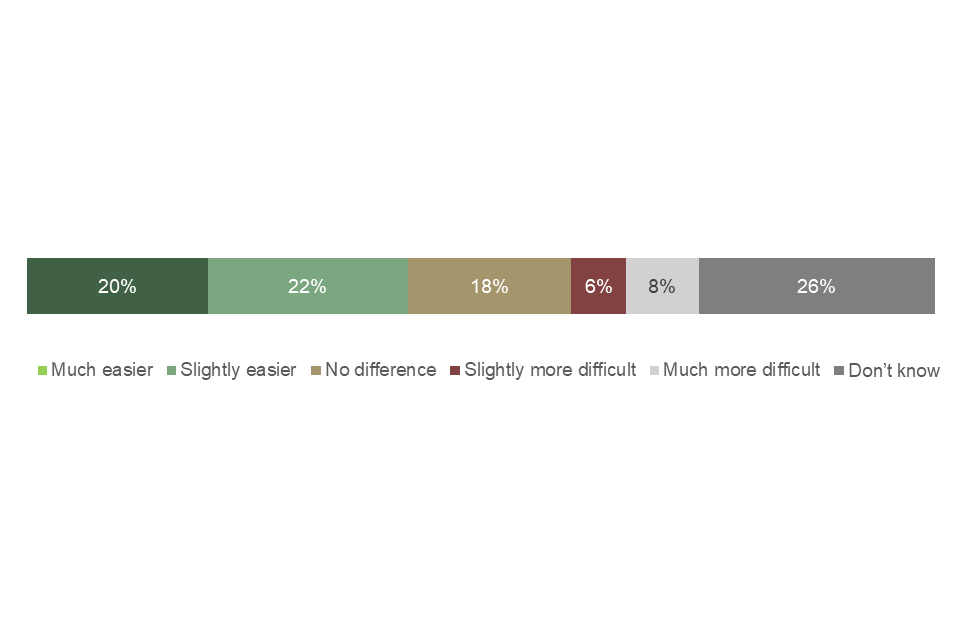
Notes:
- Have the changes in sponsorship policy made it easier or more difficult to recruit skilled migrant workers? (base=50)
Half of all employers surveyed stated that changes to sponsorship policy had influenced their decision to sponsor a skilled migrant worker.
Figure 2.5: Extent to which the Skilled Worker visa influenced employer decisions to sponsor an employee to work in the UK
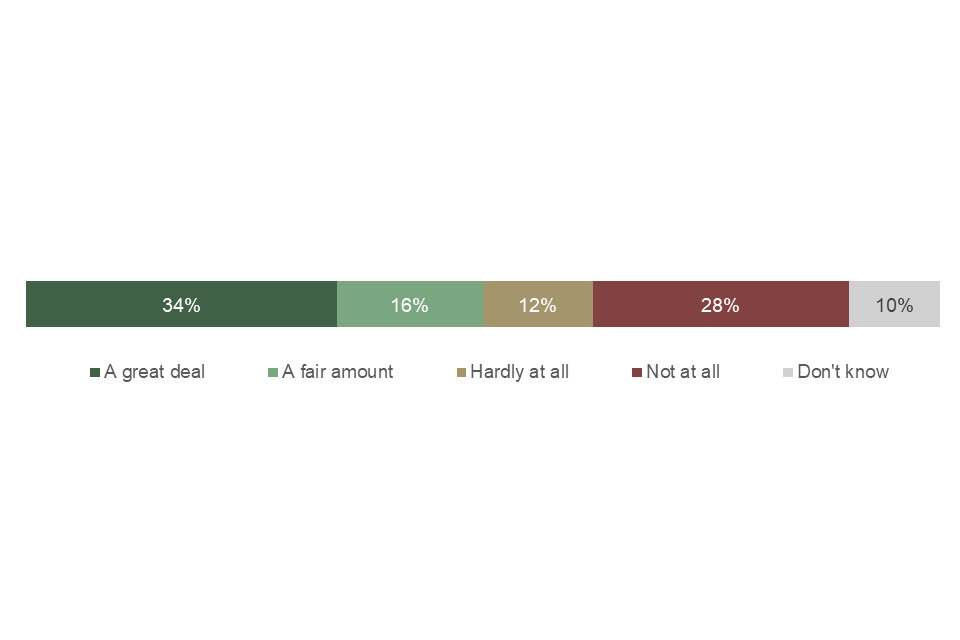
Notes:
- To what extent, if at all, did the Skilled Worker visa influence your decision to sponsor an employee to work in the UK? (base=50)
“Before Covid I didn’t need to sponsor because the workforce was there. But now the workforce is not there. So, something must be done, and the licence was the only way to entice people to work for me.” (Micro-sized sponsor, Accommodation and food service activities)
“Because of continuity. They are on a 3-year visa so they will stay with us and can build a relationship with the patients.” (Small-sized sponsor, Human health and social work activities)
Notes:
- Why do you say that the Skilled Worker visa had an impact upon your decision to sponsor an employee to work in the UK? (base=25)
The removal of the requirement for the resident labour market test had the biggest influence on employers’ decision to sponsor a skilled migrant worker, followed by expansion of skills threshold.
Figure 2.6: Factors influencing employer decisions to sponsor skilled migrant workers
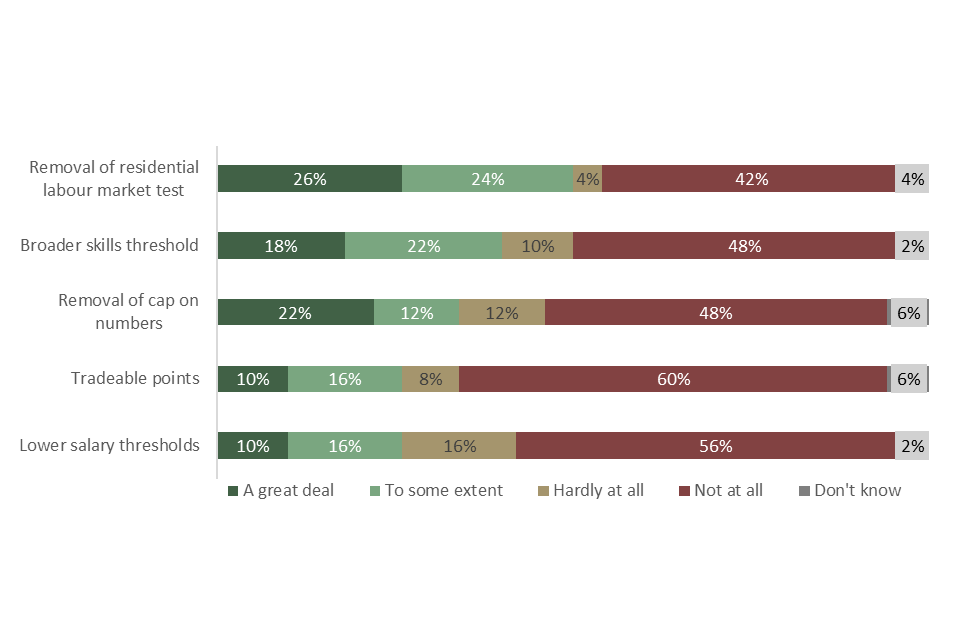
Notes:
- To what extent, if at all, did the following elements of the Skilled Worker visa influence your decision to use that route to sponsor an employee to work in the UK? (n=50)
Roughly three in four employers surveyed had provided some form of help to the skilled migrant worker they had sponsored. Most commonly stated were helping the applicant understand eligibility criteria, paying the full application fee and helping to gather supporting evidence for the application.
Help provided by employers to applicants completing the Skilled Worker visa application form
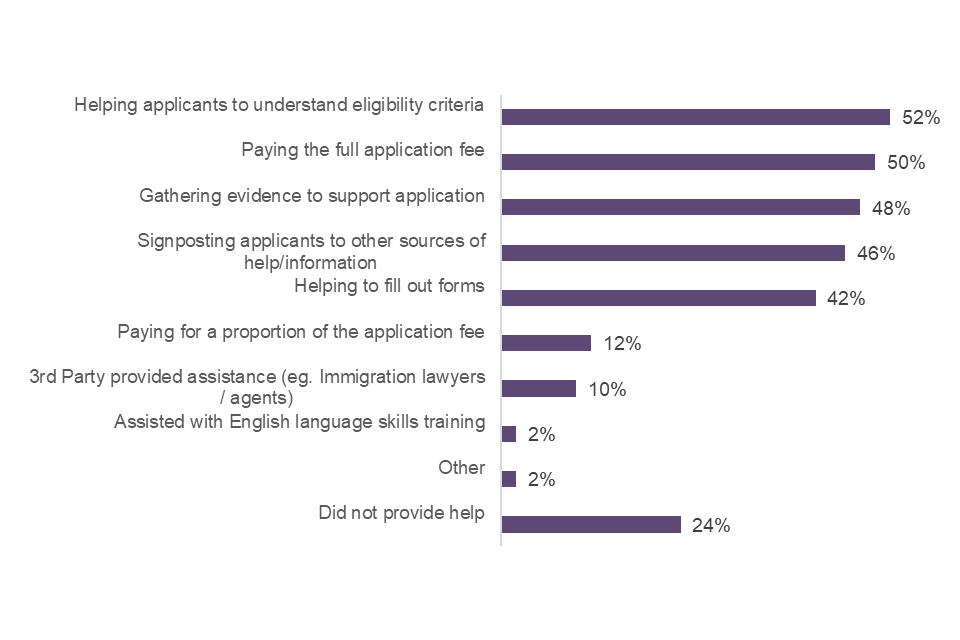
Notes:
- Did you or your organisation provide help for applicants when they are completing the Skilled Worker visa application form? (base=50)
Future intentions for vacancies and sponsorship
All sponsors surveyed expected to hire new employees in the next three to six months. Of those, a large majority (78%) will be eligible for sponsorship via the Skilled Worker visa route. Of all prospective eligible job vacancies mentioned, 44% were at RQF Level 6, and 54% were RQF Levels 3 to 5.[footnote 3]
Figure 2.8: Employer assessment of prospective job role(s) eligible for an employee on a Skilled Worker visa
| Eligible future vacancies mentioned at least once by surveyed sponsors | Number of mentions |
|---|---|
| 5434 - Chefs | 7 |
| 2136 - Programmers and software development professionals | 4 |
| 3539 - Business and related associate professionals n.e.c. | 3 |
| 3545 - Sales accounts and business development managers | 3 |
| 5449 - Other skilled trades n.e.c. | 3 |
| 6146 - Senior care workers | 3 |
| 2231 - Nurses | 3 |
| 3114 - Building and civil engineering technicians | 2 |
| 5241 - Electricians and electrical fitters | 2 |
| 2135 - IT business analysts, architects and systems designers | 2 |
Notes:
- What are the prospective job role(s) that will be eligible for an employee on a Skilled Worker visa? (base=39)
The most likely method employers will use to fill these future vacancies is to hire a UK worker, followed by sponsoring an applicant for the Skilled Worker visa route.
Figure 2.9: Employer intentions for filling prospective job role(s) eligible for an employee on a Skilled Worker visa
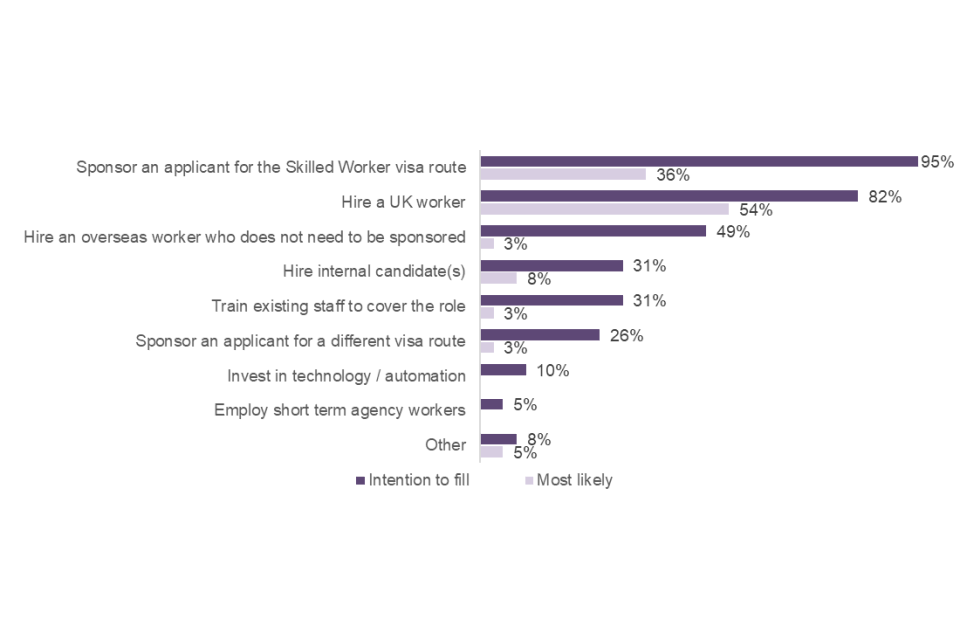
Notes:
- How do you intend to fill this/these vacancies? And which one of these options do you think is most likely? (base=29)
The reasons employers gave for hiring a UK worker relate to speed, administrative burden and cultural fit, while for sponsoring skilled workers, the reasons relate to skills and a lack of UK applicants.
Hiring UK workers
“When someone is available they can start immediately after the DBS check, so is the preferred option and so most likely. They know the country and the culture.” (Small-sized sponsor, Human health and social work activities)
“Because we’re based in the UK where people have more recognition and knowledge of our company, and the fact it is easier to hire within the UK, with less admin involved.” (Small-sized sponsor, Other service activities)
Sponsoring skilled migrant workers
“We will find workers through all 3 routes, but most will come from overseas on a Skilled Worker visa, as there is a wider pool of people to choose from.” (Medium-sized sponsor, Professional, scientific and technical activities)
“So far, I don’t see improvement in the UK job market. Nobody calls, and there’s not much choice. I need the roles filled as there are client jobs to be completed.” (Micro-sized sponsor, Construction)
Notes:
- Why do you say that answer to previous question is the most likely option to fill future vacancy/ies? (base=39)
The researchers offered employer sponsors the opportunity to provide any final reflections and they gave both positive and critical feedback in equal measures.
“It’s been a good thing from the Government. They don’t always get it right, but this time they deserve praise for the ease and success of the skilled migrant workers visa.” (Small-sized sponsor, Other service activities)
“There are lots of educational material available, and I found the process very easy and logical.” (Micro-sized sponsor, Information and communications)
“The speed needs to be quicker as this takes at least 2 months and is very complicated. Should not have to hire a lawyer – if we filled out the form incorrectly we go to the back of the queue. If someone leaves my business I need someone within 2 weeks.” (Small-sized sponsor, Accommodation and food service activities)
“The actual process is very [user] unfriendly, the guidance is daunting, the difficulty of speaking to a human is incredibly poor, having to only communicate by email which seems to take at least 10 working days for a response is appalling, and lack of answering queries is not right. I think to charge employers £2.50 to talk to somebody and the other costs is shocking. I would say that the general impression I have is that it is by sheer luck you go through the process without having to ask any questions.” (Large-sized sponsor, Construction)
Notes:
- Having answered these questions about recruiting skilled migrant workers, do you have any further reflections about this that you would like to share? (base=50)
-
Note that the last two statements are negatively phrased so respondents’ disagreement with the statement depicts positive satisfaction. ↩
-
Results recalculated to a base size of 50. ↩
-
The Regulated Qualifications Framework (RQF) has nine levels from Entry Level through to Level 8 (highest). The level of a qualification shows how difficult the learning is. For example, Level 3 is equivalent to A/AS Levels and Level 8 is equivalent to a doctorate. ↩
